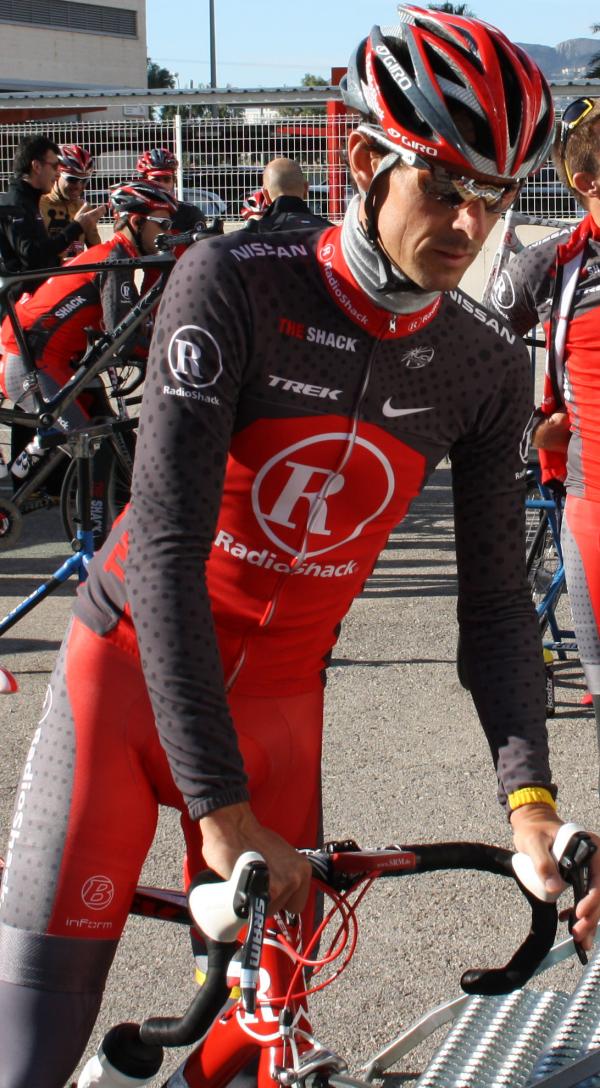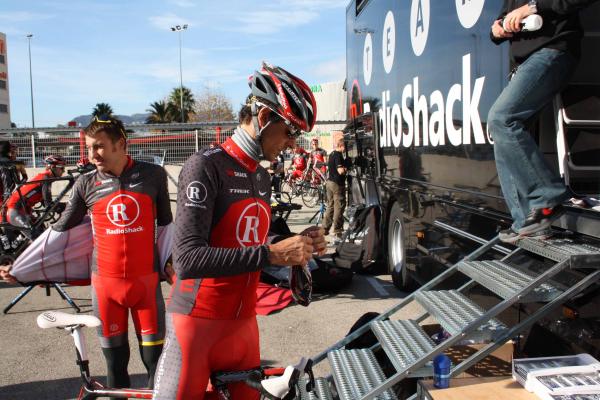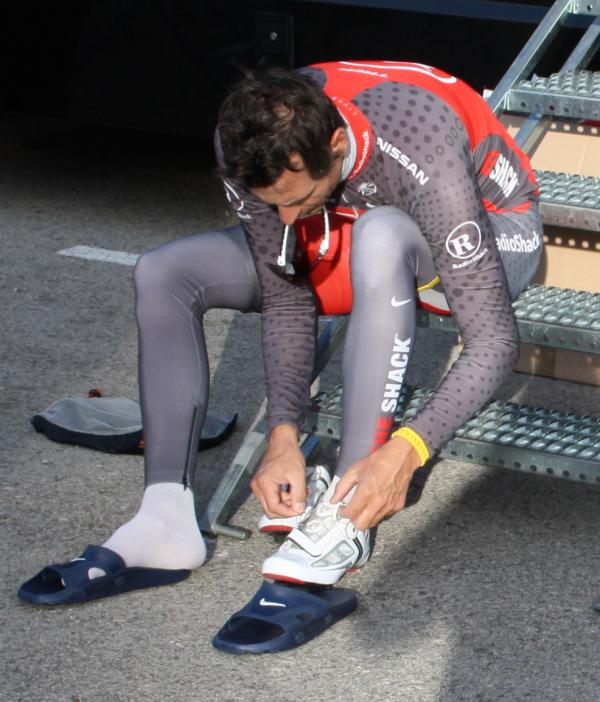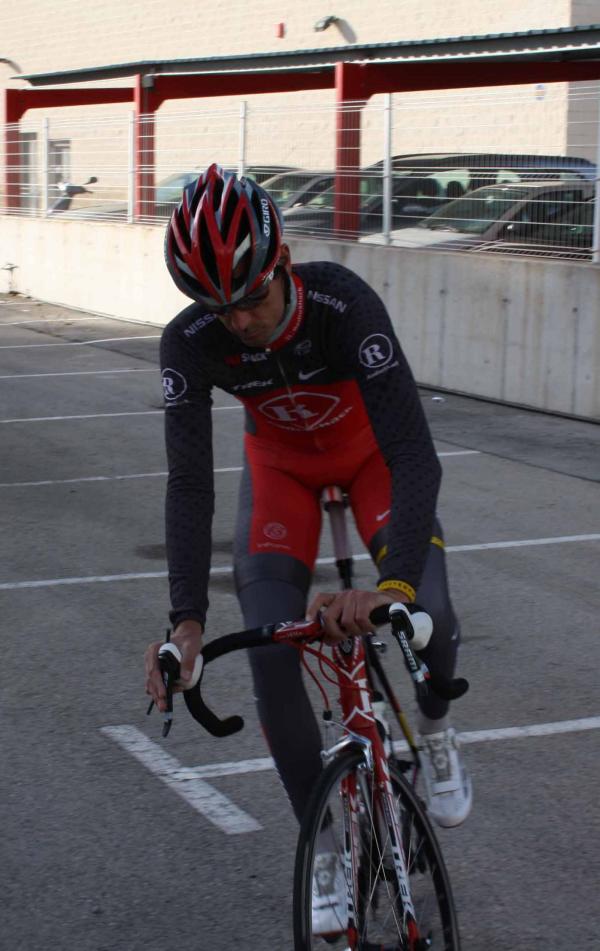Klöden on Ullrich, the German media and staying motivated
Exclusive interview with RadioShack's enigmatic German




Andreas Klöden walked into the hotel lobby weighed down by two heavy shopping bags from the supermarket across the road. After putting in an extra couple of hours alone at the end of the first group ride of Radio Shack’s Calpe training camp, the German had returned too late for lunch and was forced to improvise. No matter. All his career he has been thinking on his feet. Doing what it takes.
“If you have a chance and the weather is like this, you have to ride for five hours,” Klöden said to Cyclingnews. “I wouldn’t get on the bike for two and a half hours. I know what I need so this week is important as I have good weather here.”
That morning before training, Klöden’s organisation was already glaringly apparent. While most of his teammates languidly descended in ones and twos from breakfast, their shoes' cleats clip-clopping casually on the tarmac as they exchanged multi-lingual banter, Klöden was already riding up and down the hotel car park adjusting his SRM power meter, impatiently waiting for the off.
RadioShack’s December training camp may have had a first day of school vibe, but Klöden was already thinking of the final exams.
“You need a strong head, also in the winter,” Klöden said as he sat down. “Look at today. I see young guys who only trained for two, two and a half hours, and they are also coming from the winter. It’s a little bit strange because normally when you are young, you have more motivation…”
Motivation is one thing Klöden clearly isn’t lacking, even at 35 years of age. In the depths of winter, his thoughts were already trained on RadioShack’s Tour de France challenge. While the course is not ideally suited to his time trialling skills, he acknowledged the old truism that it’s the riders who make the race and not the route.
“If you have the power on the climbs, you’re also good in the TT, but if you don’t have the power on the climb, you’re not good in the TT,” he said. “I saw it this year in the last TT where there was this f***ing strong headwind in the end!”
The latest race content, interviews, features, reviews and expert buying guides, direct to your inbox!
In any case, he will initially share the burden of leadership at the Tour with Levi Leipheimer and Janez Brajkovic. It will be decided on the road who will be supported in the mountains.
“I don’t think we’ll have a big leader for the Tour. We’ll ride the first week and then we’ll see. Last year, Levi was a little better than me in the GC after the Alps, so I rode for him but then he had a bad day so we were almost the same.
“Every year isn’t the same but I know I can do well because I’ve been second twice already [2004 and 2006]. This year, we do have Janez in the team. He looks very strong and so is Levi, but then you can have five or six strong riders, but you must have one who can stay with the best.”
In Klöden’s mind there is no doubt as to who was the best in recent years, even when the Astana team was supposedly split between Lance Armstrong and Alberto Contador. “Two years ago, it was clear that we would ride for Alberto because he had the best chances to win the Tour and he needed good helpers.”
Indeed, Klöden is a rider who has spent much of his career riding in the service of others rather than leading a team of his own. However, he insists that, contrary to popular opinion, this was not the result of any lack of ambition on his part but rather down to circumstance.
“When I look back on my career now, I just think the situation was like that. Some years I did want to change teams but there weren’t so many options. I mean, if I wanted a team in 2009, where could I have I gone? Lotto had Evans, Rabobank had Menchov…
“I never had the chance to say ‘ok, this team can give me this,’ because at T-Mobile Jan [Ullrich] was there and also [Alexander] Vinokourov. When I changed to Astana, Vino came too and then Alberto.”
Ullrich and Klöden: a special rapport
In spite of his own achievements, which include wins in Paris-Nice, Tirreno-Adriatico and an Olympic bronze medal, Klöden’s career will be forever intertwined with that of his close friend and erstwhile leader Jan Ullrich. Before arriving in Spain for RadioShack’s training camp, the pair had even holidayed and trained together in Dubai.
“I’m a very good friend of Jan’s and the last two or three years have been harder than people think. I am happy that he is better. He was in the clinic and the hospital, but now he is much better, he has a good way in his life. He trains, not so much, but for himself to keep fit. I have never seen him as happy in the past two or three years as he was in Dubai.”
Ullrich was prevented from riding the 2006 Tour de France for his involvement in Operacion Puerto and retired from the sport in 2007. In the intervening period, he has been distanced from cycling and faced difficulties in his private life, which Klöden feels have been exacerbated by the German media.
“Jan’s problem was that he was a German rider because in the German press if you are good they push you to the top, maybe over the top, and then if they have the chance to kill you, they kill you.
“They tried the same with Steffi Graf when she had problems with taxes because her father was doing something she didn’t know about, and with Boris Becker when he was splitting with his wife. But these are Germans, you know, they need stories. Boom, boom, boom.
“It’s four years now [since Operacion Puerto] and Jan has paid a lot. He only wants silence for his family. Once I asked a guy, ‘do you want Jan to end up like Pantani or Jimenez? Would that make you happy?’”
Klöden contrasts the treatment of Ullrich in Germany with Ivan Basso’s rehabilitation of his image in Italy after being suspended for his links with Dr. Eufemio Fuentes. Basso confessed to “attempted doping” in the spring of 2007.
“Basso made a mistake and he paid for this for two years and he came back,” Klöden said. “In Italy he is famous now again, but in Germany they still say that Ivan Basso won the Giro BUT....”
German cycling: from boom to bust
Of course, Klöden’s antipathy towards the German media does not stem solely from its Jan Ullrich feeding frenzy. In October last year, he agreed to pay a €25,000 fine to end an investigation into his alleged role in a blood doping incident at the 2006 Tour de France, when it was reported that he had travelled to Freiburg after the first stage of the race to undergo a blood transfusion along with his then T-Mobile teammate Patrick Sinkewitz.
In recent years, Klöden has stopped talking to his home country’s media and even the interview that he granted Cyclingnews was in itself something of a rarity. He explains that his reticence to speak to the press stems from his fatigue at the climate of suspicion that cycling’s problems have generated in the past decade.
“I think cycling has tried to do everything but there are people in the media in Germany who don’t want to hear this. That’s the problem and that’s why I don’t talk to them,” Klöden said. “You can explain to them what you think but they don’t want to know. Their first question is ‘what happened in 2004? What happened in 2005?’”
By 2006, there were three German teams in the ProTour but in the aftermath of Operacion Puerto and Ullrich’s downfall, the bubble burst spectacularly. T-Mobile left the sport at the end of 2007 and Gerolsteiner were to follow in 2008 when a series of positive tests hit the team. When Milram folded at the end of this season it marked the definitive closing of an era.
Klöden felt that there was considerable hypocrisy on display during the boom period and was unimpressed by the declarations of certain figures within German cycling. “Like with [former Gerolsteiner manager Hans-Michael] Holczer – it was ‘blah, blah, blah, I have the best team, everybody is clean.’ But what about afterwards? Schumacher, Kohl, Rebellin [three Gerolsteiner riders who tested positive for CERA –ed.] Sometimes it’s better that you’re quiet and shut up.”
In fact, shutting up is something that Klöden maintains German cycling should do collectively, and he firmly chooses to point the finger of blame for cycling’s current crisis at press coverage of the sport’s ills rather than the root problem of doping itself.
“For me, the best thing that could happen now would be that they finish with the TV and press in Germany for the next two or three years. If people can’t read about cycling and can’t talk about cycling, then there would maybe be a chance to say ‘ok, now let’s have a new start.’ We’re always talking about the past, about 2006 or 2000 or 2001, but nobody talks about how many doping controls we have.
“We hear people saying we haven’t enough controls, we must be tested during the night, all this shit. People in Germany, even the supporters, they can’t listen to it anymore, they are tired of it,” he said wearily. “For sure you can’t say that now everyone is thinking ‘ok, we ride clean,’ but then you have criminality in all walks of life…”
A different time
Before Klöden left to eat his hastily cobbled together lunch, he took the time to reminisce briefly about his first training camps as a professional and a stark contrast emerges between his irritation at the German media and his nostalgia for the heady days of Team Telekom, where he turned professional in 1998. The enthusiasm and work ethic of men like Udo Bölts and Jens Heppner is clearly something that still inspires him when he leads out RadioShack’s youngsters on a training ride.
“I had good older riders around me like Udo Bölts,” he recalled. “I never saw a guy work as hard as Udo. He often said to me that he had no talent and so he needed to work. You should have seen him training in Mallorca, he’d always do one lap more than everyone else.”
Klöden smiled and shook his head at the memory. A lot of water has passed under the bridge since then, for him and for German cycling.

Barry Ryan was Head of Features at Cyclingnews. He has covered professional cycling since 2010, reporting from the Tour de France, Giro d’Italia and events from Argentina to Japan. His writing has appeared in The Independent, Procycling and Cycling Plus. He is the author of The Ascent: Sean Kelly, Stephen Roche and the Rise of Irish Cycling’s Golden Generation, published by Gill Books.